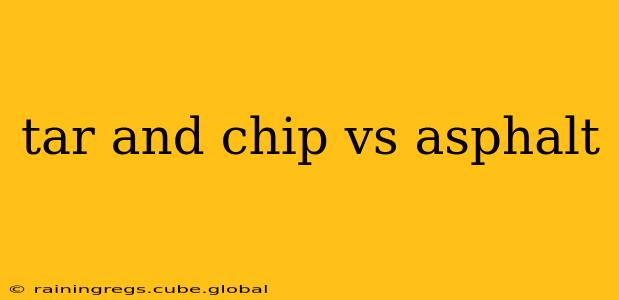Choosing the right paving material for a road project is crucial for ensuring longevity, safety, and cost-effectiveness. Two popular options frequently considered are tar and chip (also known as chip seal) and asphalt. While both provide a durable surface, they differ significantly in their composition, application, performance characteristics, and overall cost. This comprehensive guide will delve into the key differences between tar and chip and asphalt, helping you make an informed decision.
What is Tar and Chip?
Tar and chip, or chip seal, is a cost-effective paving method primarily used for maintaining existing roads or for low-traffic applications. It involves applying a layer of hot asphalt emulsion (the "tar") followed by an application of small aggregate stones ("chips"). The aggregate is embedded into the emulsion, creating a textured, durable surface.
Advantages of Tar and Chip:
- Cost-effective: Generally less expensive than asphalt paving, making it an attractive option for budget-conscious projects.
- Easy Application: The process is relatively simple and quick, leading to faster project completion times.
- Water Resistant: Provides good water resistance, preventing water damage to the underlying road surface.
Disadvantages of Tar and Chip:
- Shorter Lifespan: Compared to asphalt, tar and chip surfaces have a shorter lifespan, typically requiring more frequent maintenance and repairs.
- Rougher Surface: The textured surface can be rougher than asphalt, potentially affecting driving comfort and tire wear.
- Limited Durability: Not suitable for high-traffic areas or roads experiencing heavy loads. It's more susceptible to cracking and damage under significant stress.
- Less Aesthetically Pleasing: The surface texture is less uniform and smooth compared to asphalt, potentially impacting visual appeal.
What is Asphalt?
Asphalt, or asphalt concrete, is a more sophisticated and durable paving material made from a mixture of aggregate (like gravel and sand), asphalt binder (a petroleum-derived substance), and fillers. The precise mix design varies depending on the intended use and traffic conditions.
Advantages of Asphalt:
- Durability: Asphalt pavements are known for their long lifespan and ability to withstand heavy traffic loads.
- Smooth Surface: Provides a smooth and comfortable driving experience.
- Flexibility: Can withstand temperature fluctuations and ground movement better than tar and chip.
- Aesthetically Pleasing: Offers a more uniform and visually appealing surface.
- Versatile: Can be used in various applications, from residential driveways to major highways.
Disadvantages of Asphalt:
- Higher Cost: Asphalt paving is generally more expensive than tar and chip.
- More Complex Installation: Requires specialized equipment and skilled labor for proper installation.
- Maintenance Requirements: Although durable, asphalt still requires occasional maintenance, such as crack sealing and pothole patching.
Tar and Chip vs. Asphalt: Which is Right for You?
The best choice between tar and chip and asphalt depends largely on your specific needs and priorities:
- Budget: Tar and chip is the more affordable option.
- Traffic Volume: Asphalt is better suited for high-traffic areas.
- Lifespan: Asphalt offers a significantly longer lifespan.
- Aesthetic Preferences: Asphalt provides a smoother, more visually appealing surface.
- Maintenance: Tar and chip requires more frequent maintenance.
How Long Does Tar and Chip Last?
The lifespan of tar and chip varies greatly depending on factors like climate, traffic volume, and the quality of materials and application. Typically, a tar and chip surface can last anywhere from 3 to 7 years before requiring resealing or replacement.
Is Tar and Chip Better Than Asphalt?
There is no universally "better" option. Tar and chip is superior for its cost-effectiveness and ease of application in low-traffic situations where a shorter lifespan is acceptable. Asphalt is the superior choice for high-traffic areas, demanding longevity, and a smoother, more aesthetically pleasing surface, despite its higher cost.
What are the Different Types of Asphalt?
Several types of asphalt exist, each with different properties suitable for specific applications. These include hot mix asphalt (HMA), warm mix asphalt (WMA), and cold mix asphalt. The choice of asphalt type depends on factors such as climate, traffic volume, and project requirements.
Is Chip Seal a Good Idea?
Chip seal (tar and chip) is a good idea for low-traffic areas, temporary repairs, or when budget is a primary concern. It's not suitable for roads experiencing high traffic loads or where a long-lasting, smooth surface is required.
By carefully weighing these factors, you can make the best decision for your specific paving project. Remember to consult with experienced paving contractors to get personalized recommendations based on your individual circumstances.
